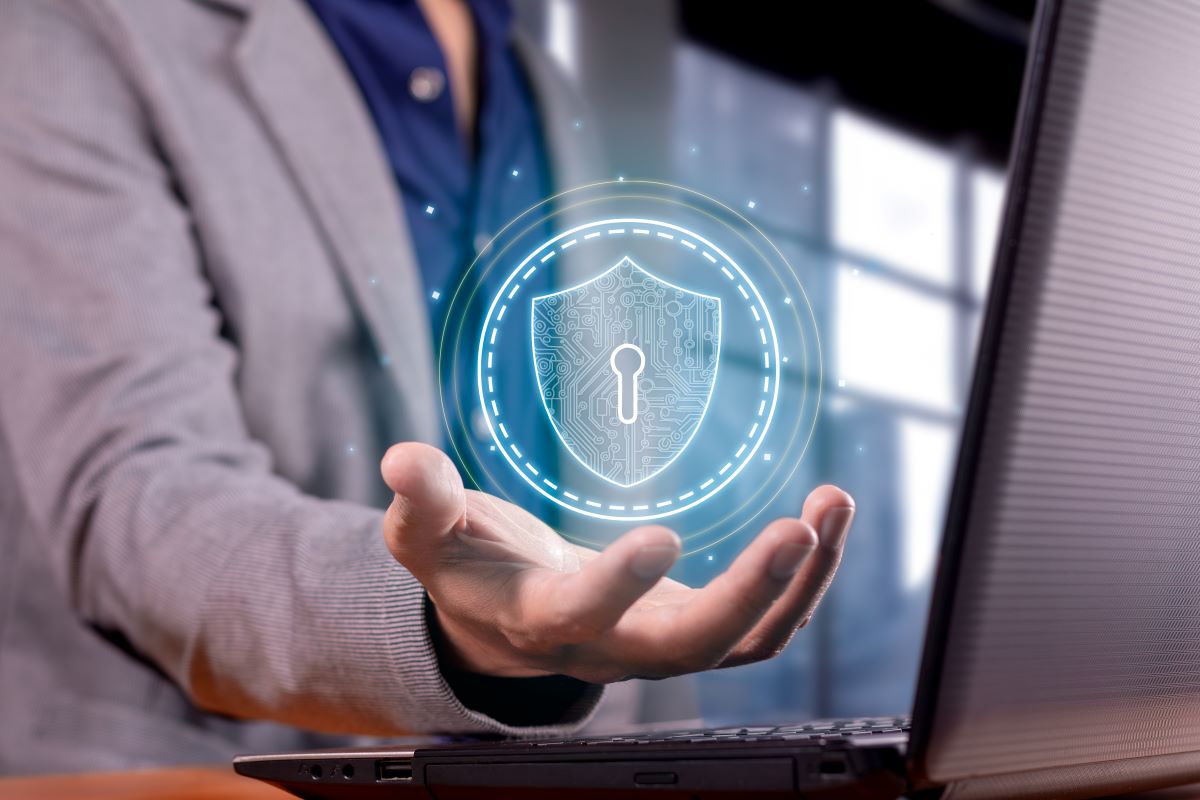Tuesday, April 15, 2025 6 min read Cybersecurity
Cybersecurity Services: A Complete Guide for Business Protection in 2025
Protect your business with expert cybersecurity services. Learn how to prevent threats, stay compliant, and secure your data in today’s digital world.

Every business, regardless of size, is at risk of a cyberattack. Investing in cybersecurity services is no longer optional—it's essential to protect your data, your reputation, and your bottom line.
Why Cyber Security Services Are Crucial
A single breach can result in:
Lost Customer Trust
When personal data is compromised, customers are quick to lose confidence in your ability to protect them. A breach can tarnish your brand reputation for years, especially in industries like finance, healthcare, and e-commerce where trust is paramount. Cybersecurity services help prevent such incidents by proactively identifying and mitigating risks.
Regulatory Penalties (HIPAA, GDPR, PCI-DSS)
Non-compliance with data protection laws can result in steep fines. For example, under the GDPR, companies can face penalties of up to 4% of their annual global turnover. Cyber security services ensure your organization is meeting regulatory requirements through compliance assessments, reporting, and security frameworks.
Legal Action
A data breach could lead to class-action lawsuits, especially if customer or employee information is leaked. Investing in cybersecurity services like incident response, data encryption, and risk management can significantly reduce legal exposure.
Permanent Data Loss
Without proper data backups or recovery strategies, some breaches can cause irreparable damage. Cyber security services such as cloud backup solutions and disaster recovery planning are essential to ensure business continuity.

Common Cybersecurity Threats Facing Businesses
Before choosing a cybersecurity solution, it’s vital to understand the most frequent attack types:
Malware
This umbrella term refers to malicious software designed to damage or exploit any programmable device. Malware includes viruses, worms, spyware, and more. Comprehensive cybersecurity services offer malware detection, quarantine, and real-time response tools.
Ransomware
Cybercriminals encrypt your data and demand payment to restore access. In many cases, paying the ransom doesn’t guarantee recovery. Managed security services include ransomware defense strategies, secure backups, and early detection systems.
Phishing Attacks
These typically involve fraudulent emails that trick users into revealing sensitive information or clicking on malicious links. Cyber security services mitigate phishing risks through email security gateways, employee awareness training, and real-time email filtering.
Spyware
Spyware silently installs on a user’s device to gather information such as passwords or browsing history. Endpoint security tools, part of broader cyber security services, can detect and remove spyware before it causes harm.
Zero-Day Exploits
These are attacks that target unknown vulnerabilities in software. Top-tier cybersecurity providers offer threat intelligence, patch management, and zero-day attack monitoring to mitigate these highly sophisticated threats.

Core Types of Cyber Security Services
Network Security Services
Your network is the backbone of your IT infrastructure. Network security services are critical in identifying, blocking, and mitigating unauthorized access and internal threats.
- Firewalls – These act as a digital perimeter, filtering incoming and outgoing traffic based on pre-established security rules. Next-gen firewalls even use behavioral analysis to detect anomalies.
- Intrusion Detection & Prevention Systems (IDPS) – These tools monitor network traffic in real-time, flagging or blocking suspicious activity that could indicate a breach attempt.
- Network Vulnerability Scanners – Regularly scan your network to detect outdated software, open ports, and misconfigurations. These services help ensure you're protected against known exploits.
Endpoint Security
Any device connected to your network is a potential target. Endpoint security ensures that each laptop, mobile device, or server is monitored and protected.
- Antivirus & Anti-Malware – Continuously scan for known viruses, trojans, and ransomware with real-time threat detection.
- Email Security Solutions – Detect and block malicious attachments, links, and social engineering attempts.
- Device Control Policies – Prevent unauthorized devices like USB drives or rogue IoT gadgets from connecting to your network and compromising data.
Cloud Security Services
As businesses adopt hybrid and remote work models, cloud security becomes a cornerstone of cyber defense.
- Cloud Access Security Brokers (CASBs) – These tools sit between your users and cloud services, enforcing security policies and ensuring data isn’t exposed.
- Cloud Backup & Disaster Recovery – Automatically back up your critical files to secure cloud environments to ensure rapid recovery in case of ransomware, human error, or system failure.
- Access Controls for SaaS Apps – Enforce least-privilege policies and monitor access logs to ensure only the right people access sensitive cloud-based resources.
Data Security Services
Data is the most valuable digital asset. Data security services ensure your information is protected at rest, in transit, and during use.
- End-to-End Encryption – Encrypt sensitive files and communications using industry-standard algorithms like AES-256 and TLS to prevent unauthorized interception.
- Role-Based Access Control (RBAC) – Limit user access to only what they need for their role, reducing the risk of insider threats and accidental exposure.
- Data Loss Prevention (DLP) – Monitor outbound communications and data movements to prevent confidential information from leaving your network unintentionally or maliciously.
Identity and Access Management (IAM)
IAM systems help ensure that only the right people—and no one else—can access your systems and sensitive data.
- Multi-Factor Authentication (MFA) – Combine something you know (password) with something you have (like a mobile token) to dramatically reduce unauthorized logins.
- Single Sign-On (SSO) – Simplifies user access to multiple systems with one login, improving usability and reducing password fatigue.
- Audit Trails – Keep detailed logs of user activities to identify suspicious behaviors and aid forensic investigations if needed.
Managed Detection & Response + Incident Response
These services ensure that when (not if) an attack occurs, you're prepared to act quickly and minimize damage.
24/7 Security Operations Center (SOC) – A team of analysts monitors your environment in real-time for unusual patterns or threats.
- Threat Hunting & Analysis – Proactively search for threats that may have slipped past traditional defenses using AI, behavioral analysis, and threat intelligence feeds.
- Incident Containment & Recovery – Rapid response services isolate affected systems, eliminate threats, and help restore operations.
- Forensic Investigation Reports – Post-breach, experts analyze logs, trace attack vectors, and provide documentation for legal or compliance purposes.

Cybersecurity Best Practices Every Business Should Follow
Even the best tools won't protect your business without strong day-to-day practices. Combine your cybersecurity services with these proactive measures:
Secure by Design
Build security into your systems from the ground up. Whether you’re developing apps, launching new products, or expanding IT infrastructure, ensure cybersecurity is considered at every stage—not just as an afterthought.
Employee Awareness Training
Human error is a leading cause of security incidents. Train employees on:
- Recognizing phishing emails
- Using secure passwords and MFA
- Avoiding dangerous downloads or websites
Many cybersecurity service providers offer ongoing security awareness training as part of their packages.
Regular Software Updates and Patch Management
Outdated software is a goldmine for hackers. Ensure:
- All systems and applications are patched regularly
- Vulnerabilities are tracked using CVE databases
- Updates are tested and deployed quickly, especially for business-critical systems
Industry Compliance Audits
Are you subject to GDPR, HIPAA, PCI-DSS, or SOC 2? Failing to meet compliance standards can result in fines and legal consequences. Cybersecurity services can assist with:
- Compliance assessments
- Gap analysis reports
- Ongoing monitoring and policy enforcement

How to Assess Your Cybersecurity Posture
Before choosing or upgrading your cybersecurity services, assess where your business stands today:
Conduct Risk Assessments
Identify weaknesses across your infrastructure, endpoints, and employee behavior. Regular risk assessments ensure your defenses evolve with the threat landscape.
Evaluate Your In-House Capabilities
Do you have the staff and skills to manage cybersecurity internally? Many businesses choose managed security service providers (MSSPs) to fill skill gaps and reduce the burden on internal teams.
Build a Cybersecurity Roadmap
Use your assessment to create a long-term plan:
- Prioritize quick wins and high-risk vulnerabilities
- Set quarterly goals for security improvements
- Align your strategy with business objectives
Conclusion: Stay Ahead with the Right Cyber Security Services
Today, cybersecurity is not optional—it’s foundational to business success. From network firewalls and endpoint protection to identity management and incident response, cybersecurity services offer the layered defense your business needs.
Whether you're a startup or an enterprise, investing in a tailored cybersecurity strategy is one of the smartest decisions you can make. It protects your data, reassures your customers, and builds long-term resilience.
Don’t wait for a breach to take action.
Work with a trusted cybersecurity partner to assess your risks, implement best practices, and stay ahead of emerging threats.

FAQ: Cyber Security Services for Businesses
What are cybersecurity services?
Cyber security services include tools and expert support to protect your business from digital threats. This can include network monitoring, endpoint protection, cloud security, data encryption, and incident response.
Who needs cybersecurity services?
Every business that uses digital systems or handles customer data—whether a small eCommerce store or a large enterprise—should invest in cybersecurity.
How much do cybersecurity services cost?
Costs vary based on your business size and needs. Basic packages for small businesses may start around $500/month, while enterprise solutions with 24/7 monitoring and advanced threat detection can exceed $5,000/month.
What’s the difference between IT support and cybersecurity services?
IT support focuses on general tech issues like system maintenance and user support. Cyber security services specialize in protecting your systems and data from cyber threats, often with advanced tools and expertise.
Related Article: Why Cyber Security is Important for Businesses